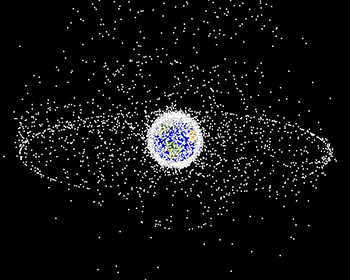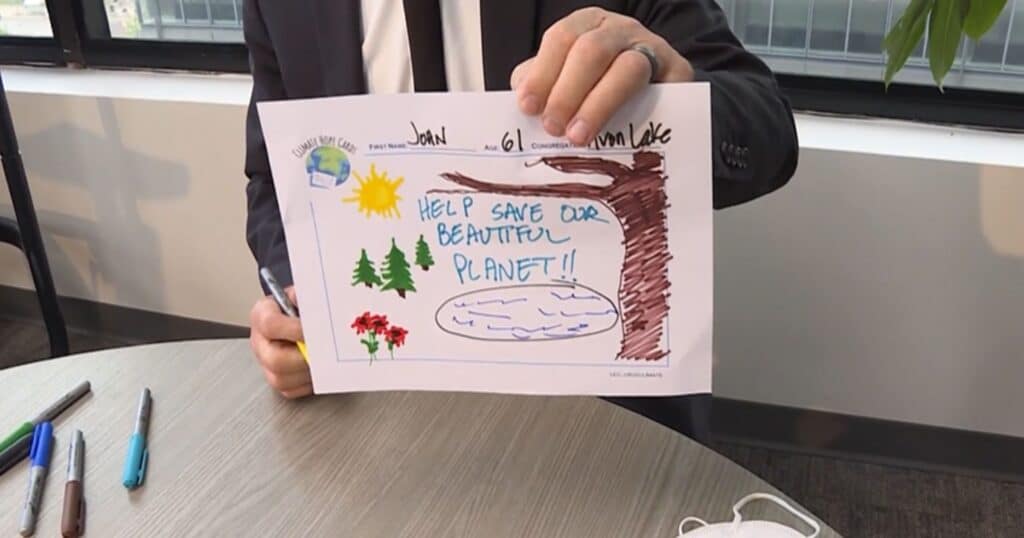Clean Space Investors
 |
| Space debris seen from high Earth orbit (HEO). The two main debris fields are the ring of objects in geosynchronous Earth orbit (GEO) and the cloud of objects in low Earth orbit (LEO). Photo: |
In 2015, the UCC General Synod passed a resolution on Responsible Stewardship of the Outer Space Environment. Through a regular series of articles, the UCC maintains its commitment to addressing the serious threats posed by space debris.
Professor Claude Nicollier from the Swiss Space Center thinks global warming and space debris pose a similar challenge to society. “If we don’t do anything now,” he writes, “we’ll have big problems in the future.”
Shareholder engagement is one effective strategy for addressing global warming. “Green investors” advocate with companies to make public commitments to reduce greenhouse gas emissions (GHG) and disclose their progress. As a result of such efforts, Qualcomm plans to reduce GHG by 30% by 2025; Colgate intends to reduce emissions by 25% by 2020; and Johnson & Johnson announced a goal of 100% renewable energy by 2050.
Now it’s time to devise a similar strategy to protect the space environment. Call it “clean space” investing.
In 2011, the National Research Council (NRC) reported the space debris problem had reached a tipping point in key orbits. Even if we stopped launching satellites today, debris would continue to grow because collisions generate new pieces of debris faster than atmospheric drag removes them from orbit. The new debris further increases the frequency of collisions and risk of satellite destruction.
Now comes a report from the United Kingdom’s Foreign and Commonwealth Office that estimates the satellite population could grow from 1400 to 18,000 during the next decade. As orbits become increasingly congested, international concern is growing that space will become too dangerous to navigate.
Many of the new spacecraft will be small satellites (smallsats) with miniaturized components and standardized parts that are relatively cheap to build. There is booming demand from Fortune 500 companies for the global communications networks and big data sets they provide.
Global corporations such as Google, Facebook, Airbus, Harris, and FedEx are investing heavily in smallsat companies and technology. New firms such as Planet Labs, Spire, BlackSkyGlobal, and OneWeb are garnering significant venture capital. Although the space industry is still tiny compared to other sectors, analyst Chris Quilty of Raymond James says commercial activity in space will reach a tipping point in five years as more companies make money and list on public exchanges.
As the industry grows and stock portfolios include more space companies, investors will find opportunities to advocate with firms to improve their policies and practices for operations in the space environment.
They have their work cut out for them.
To its credit, the Satellite Industry Association (SIA) recommends that member companies adopt several measures to reduce the risk of on-orbit collisions and prevent debris creation. These include incorporating tracking devices on spacecraft; sharing data about orbital positions with other operators; ensuring satellites can be maneuvered during their operational lifetime; and safely disposing of satellites at the end of their mission.
However, my review of corporate responsibility statements, websites, and annual reports from several leading U.S. satellite companies that are listed on exchanges indicates they have yet to make public commitments to policies and practices that prevent debris creation.
In fact you have to look across the Atlantic to the London Stock Exchange for a company that makes such a commitment. Inmarsat, part of the FTSE 250 index, provides mobile and fixed communications services. It articulates its goal of minimizing its environmental impact in space as part of its statement on corporate responsibility. Moreover, it uses its website and annual reports to disclose its progress toward meeting this goal. For example, a recent report notes the company’s successful disposal of a satellite operated by an Asian business partner.
As Professor Nicollier says, we need to do something now about space debris.
One thing green investors could do is expand their mission and become clean space investors, too.
Rev. Robert Bachelder is Minister and President of the Worcester Area Mission Society, UCC in Massachusetts and author of the General Synod resolution on responsible stewardship of the outer space environment.
Related News
The UCC’s 2025 Climate Hope Art Contest
Register now! For the third straight year, the UCC is conducting a Climate Hope Art...
Read MoreFinding Faith in Cancer Alley
Cancer Alley is the nickname given to 80 miles of the Mississippi between Baton Rouge and New...
Read MoreCall to Address Environmental Racism in Alabama Community
For six years, the Shiloh community of Elba, Alabama has faced severe flooding caused by the...
Read More


